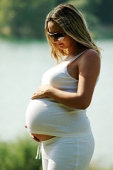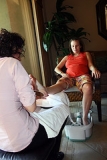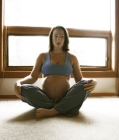Walk With Your Baby
 Exercise during pregnancy was once thought to be risky business. But that is old thinking. Exercise is good for you (especially if you are overweight) and the safest way to remain active is to walk. The moment you realise you are pregnant, stop all other forms of exercise until you consult your gynaecologist. After all the tests are done and the doctor clears you for exercise, start walking at a slow to moderate pace to be active and keep the pregnancy related signs of discomfort at bay. I have advised women to walk their way to fitness through the nine months of pregnancy and have realised that the women who adopted regular walking not only stayed fit during pregnancy, but also calm and stress-free during labour. They also recovered faster after their delivery.
Exercise during pregnancy was once thought to be risky business. But that is old thinking. Exercise is good for you (especially if you are overweight) and the safest way to remain active is to walk. The moment you realise you are pregnant, stop all other forms of exercise until you consult your gynaecologist. After all the tests are done and the doctor clears you for exercise, start walking at a slow to moderate pace to be active and keep the pregnancy related signs of discomfort at bay. I have advised women to walk their way to fitness through the nine months of pregnancy and have realised that the women who adopted regular walking not only stayed fit during pregnancy, but also calm and stress-free during labour. They also recovered faster after their delivery.
Walking During Pregnancy Will Help To:
Keep muscles toned .
Get fresh air and ensure better circulation.
Keep body functions regular.
Sleep better
You can continue walking up to the last day of pregnancy if all other symptoms are normal. A slow walk, every day, will help you cope better with usual pregnancy problems – morning sickness, aches and pains.
How Far / How Often:
 If you have been a regular exerciser, keep walking at a moderate-to-brisk pace after consulting your doctor. Don’t worry about the distance. Simply time yourself and walk for 20 to 30 minutes, at least twice a day, five days a week.
If you have been a regular exerciser, keep walking at a moderate-to-brisk pace after consulting your doctor. Don’t worry about the distance. Simply time yourself and walk for 20 to 30 minutes, at least twice a day, five days a week.
Aches And Pains:
As you progress with your pregnancy, physical discomfort becomes a reality. Your growing size often results in a faulty posture which leads to aches and pains in the upper and lower back and the legs. Cramps in the calves are quite common and you should frequently stretch the calf muscles.
- Place both hands against a wall.
- Stand with the right leg behind the left, in a wide stance.
- Bend the forward knee and keep the back leg straight without bending the knee so that the heel touches the floor.
- The arms support the weight of your heavy, ballooned body.
- Feel the calf of the back leg stretching. If you get cramps at night, then flex the feet (pointing the toes towards you) and hold for a few seconds. You can do this stretch while sitting in a chair, just as well.
Posture And Weight:
 Walk through the second trimester as well – you should walk at the pace you find comfortable. Just because you have gained weight, you do not have to compromise your walking posture or gait. Maintain a stress-free spine as far as possible. Do not waddle with the abdomen pushed forward.
Walk through the second trimester as well – you should walk at the pace you find comfortable. Just because you have gained weight, you do not have to compromise your walking posture or gait. Maintain a stress-free spine as far as possible. Do not waddle with the abdomen pushed forward.
To Get A Correct Posture:
- Stand straight.
- Do not lean forward from the upper body or lean back.
- Keep the chin parallel to the floor.
- Relax the shoulders.
- Tuck in your buttocks by tilting your hips slightly forward. This will prevent over-arching of the lower back.
Foot Care During Pregnancy:
 The body’s centre of gravity shifts during pregnancy. You are likely to feel a bit wobbly and therefore need shoes with more support and stability. As far as possible, avoid wearing high heels.
The body’s centre of gravity shifts during pregnancy. You are likely to feel a bit wobbly and therefore need shoes with more support and stability. As far as possible, avoid wearing high heels.
Since swelling of feet and ankles is common, you may prefer wearing a wide pair of shoes for comfort. Hormonal changes relax the ligaments in the feet and this may lead to excessive foot strain. Good quality, supportive shoes are necessary to prevent any long-term damage to the feet.
To prevent excessive falling in of the arches wear good quality walking shoes that have heel and arch support. While sitting, keep the feet and legs elevated to prevent swelling.
The Last Few Days:
Walking in the last trimester, especially in the last few days before delivery, can become more difficult. You should rest frequently during the walk. It is a good idea to have a friend or a family member walk along with you. In addition, keep yourself active through the day. Take extra care to keep yourself well hydrated during pregnancy, especially while walking.
Precautions:

- Stop all exercises at once if you have any of the following symptoms and consult your doctor immediately.
- Dizziness which refuses to go away.
- Shortness of breath.
- Leaking of fluid from the vagina.
- Bleeding or spotting
- Unusual pain in the abdomen and lower back
- Palpitations and sweating
- Sudden, severe headaches
- High blood pressure
- Absence of any foetal movement.